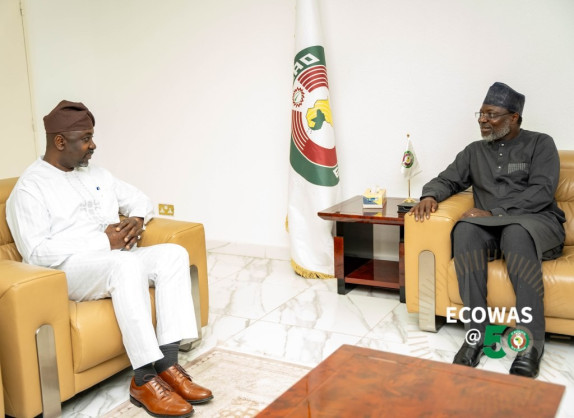West Africa: Visit of Mr. Adedeji Ebo, director and deputy to the high representative for disarmament affairs United Nations Office for Disarmament Affairs (UNODA)

The United Nations Regional Centre for Peace and Disarmament in Africa (UNREC) and the Economic Community of West African States (ECOWAS) Commission jointly issue this communiqué following the official visit of Mr. Adedeji Ebo, Director and Deputy to the High Representative for Disarmament Affairs of the United Nations Office for Disarmament Affairs (UNODA), to the ECOWAS Headquarters in Abuja, Nigeria. UNREC is UNODA’s Regional Centre for Africa.
The visit served as a renewed demonstration of the United Nations’ steadfast support to regional mechanisms for peace, security, development and arms control in West Africa. It marked a significant milestone in the broadening and deepening collaboration between UNODA—through UNREC—and ECOWAS on disarmament, arms control and regional peace and security priorities towards a culture of peace.
During the visit, Mr. Ebo held strategic consultations with the ECOWAS President H.E Dr Omar Alieu Touray, ECOWAS Commissioner for Political Affairs, Peace and Security, H.E. Ambassador Dr Abdel-Fatau Musah, as well as with senior leadership of the ECOWAS Department of Political Affairs Peace and Security. Discussions focused on reviewing the 2009 ECOWAS-UNODA Memorandum of Understanding in order to align it with current peace and security challenges in the sub-region. Topics included advancing the implementation of the ECOWAS Convention on Small Arms and Light Weapons (SALW) and tackling persistent and emerging threats in the region, including illicit arms flows, improvised explosive devices (IEDs), cybersecurity, artificial intelligence (AI), drones, and autonomous weapons systems.
The visit was also marked by the holding of a joint UNREC – ECOWAS Regional strategic workshop on gender mainstreaming in Small Arms control in West Africa in efforts to raise awareness and enhance the capacity of West African countries to effectively address gender-specific issues in SALW control and incorporate youth participation into programs.
UNREC and ECOWAS agreed to explore options for a strategic reconfiguration of the ECOWAS Small Arms Division to broaden its scope beyond SALW. The entities also reaffirmed their commitment to strengthening regional frameworks and initiatives—including the ECOWAS Convention on SALW, the Nairobi Protocol, and the African Union’s Silencing the Guns initiative—through enhanced coordination and technical support. UNREC and ECOWAS will also collaborate to provide tailored assistance to national stakeholders, leveraging and contextualizing existing tools for addressing small arms and ammunition, disarmament education platforms, and facilitating access to capacity-building programs.
Mr. Ebo commended ECOWAS Commission for its leadership in promoting peace and disarmament across the region and reiterated UNODA’s commitment to supporting ECOWAS Member States in building technical capacity, reinforcing legal frameworks, and advancing inclusive, evidence-based policy responses.
Considering recent peace and security developments in the region, both Mr Ebo and H.E. Ambassador Dr Abdel-Fatau Musah reiterated commitment to the effective implementation of the ECOWAS Convention on SALW, particularly its provisions related to cross-border arms control cooperation, harmonized legislative standards, and regional monitoring mechanisms. Dr. Musah cited the expanding terrorism in the region, as well as intercommunal violence and banditry as phenomena that highlight the imperative of heightened arms control as a priority. UNODA and ECOWAS reaffirmed the continued relevance of the Convention and agreed to explore pragmatic pathways for inclusive dialogue and cooperation with all West African stakeholders to uphold collective security and reduce the risk of arms proliferation in West Africa.
Furthermore, UNODA expressed its readiness to support the ECOWAS Commission, through UNREC, in initiating a review and update of the ECOWAS Convention on SALW to reflect new developments in the security landscape. This includes incorporating provisions on growing threats such as the trafficking of ammunition and the implementation of the Global Framework on Through-Life Ammunition Management (GFA), weaponization of Information and Communication Technologies (ICT), cyber-enabled arms flows, and the challenges posed by emerging technologies, science, and innovation in weapon systems. The parties acknowledged the need to ensure the Convention remains responsive, comprehensive and effective in addressing the evolving nature of arms control, non-proliferation and disarmament in West Africa.
Both entities agreed to strengthen joint operations and advocacy, while exploring innovative strategies to integrate disarmament into broader peacebuilding and sustainable development agendas in West Africa.
Distributed by APO Group on behalf of Economic Community of West African States (ECOWAS).



